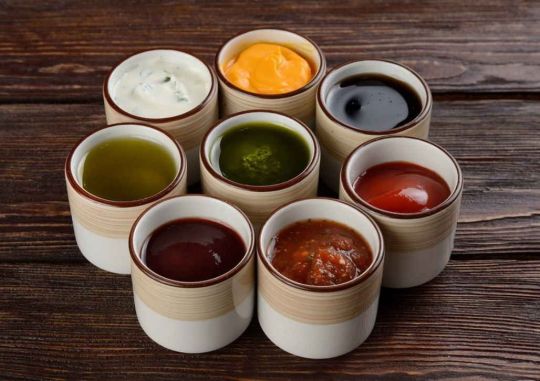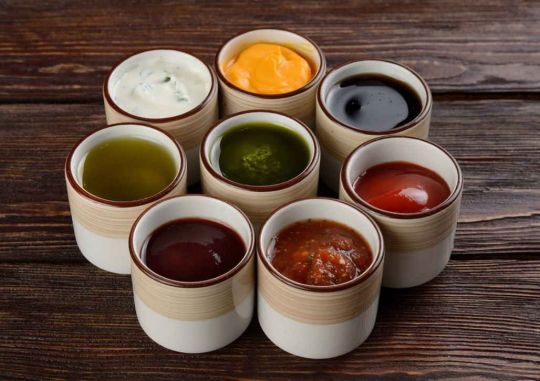#VeganSaucesMarketInsights
Explore tagged Tumblr posts
Text
Vegan Sauces Market Overview of Impacting Factors and Key Developments Shaping Future Demand and Competitive Landscape
The vegan sauces market has witnessed significant growth over the past few years, driven by shifting consumer preferences toward plant-based diets and healthier food options. As consumers become increasingly aware of the health benefits of plant-based products, the demand for vegan sauces has risen, making them a staple in kitchens worldwide. This market is expected to continue growing as it adapts to consumer demands, environmental concerns, and technological innovations. In this article, we will explore the factors influencing this market and key developments that are shaping its future.

Impacting Factors in the Vegan Sauces Market
Several factors have contributed to the rise of the vegan sauces market. The most significant driver has been the growing awareness of health and wellness. As more people adopt vegan, vegetarian, or flexitarian diets, the demand for plant-based foods, including sauces, has surged. Vegan sauces are seen as a healthier alternative to traditional sauces, offering lower fat content, fewer preservatives, and the absence of animal-based ingredients. This trend is not only limited to those following vegan diets but also extends to consumers who are increasingly concerned about food quality and its effects on health.
The increasing awareness of sustainability and ethical food production practices has also played a role in the market's growth. With a rising global focus on environmental sustainability, consumers are opting for plant-based products as a means of reducing their carbon footprint and supporting cruelty-free food options. Vegan sauces, which do not rely on animal-based ingredients, align perfectly with the principles of sustainability and ethical sourcing. The growing number of environmentally-conscious consumers has made plant-based products, including vegan sauces, highly desirable.
Another factor shaping the vegan sauces market is the clean-label movement. Consumers are becoming more discerning about the ingredients used in the products they purchase. Clean-label products, which contain simple, natural ingredients with no artificial additives, are in high demand. Vegan sauces, often made with whole food ingredients such as tomatoes, nuts, and legumes, fit well into the clean-label trend, offering transparency and catering to consumer concerns about food quality.
Key Developments Shaping the Market
Several key developments are shaping the vegan sauces market, as brands innovate to cater to a broader range of consumer preferences. One significant development is the growing availability of vegan sauces in mainstream retail outlets. Once found mostly in specialty health food stores, vegan sauces are now widely available in supermarkets and online platforms. This increased accessibility has played a critical role in expanding the market to a larger, more diverse consumer base.
Innovation within the vegan sauces segment has also led to the introduction of a wide variety of new products. Manufacturers are creating plant-based sauces in numerous flavors, textures, and formats to cater to a wide range of culinary preferences. From creamy Alfredo sauces to spicy salsas, the vegan sauces market has seen an increase in product offerings designed to mimic traditional sauces while using plant-based ingredients. These innovations enable vegan sauces to compete with conventional products in terms of flavor and versatility, appealing to a broader consumer audience.
Another key development has been the rise of sustainable packaging. With sustainability becoming a critical factor in consumer purchasing decisions, many vegan sauce brands are adopting eco-friendly packaging solutions. This includes recyclable, biodegradable, and compostable packaging materials that reduce waste and support environmental sustainability. These efforts are in line with broader industry trends toward reducing plastic waste and carbon footprints.
Competitive Landscape
The competitive landscape of the vegan sauces market is becoming increasingly dynamic, with a growing number of brands vying for market share. Established brands in the food industry are launching vegan sauce variants to cater to the growing demand, while new entrants focused exclusively on plant-based products are also making significant strides. Key players in the market include both large multinational companies and smaller, niche brands that specialize in vegan and organic foods.
Some major players have focused on creating a diverse range of vegan sauces to expand their customer base and enhance brand loyalty. For example, some companies offer organic vegan sauces made from ingredients sourced through sustainable practices, ensuring that they appeal to environmentally-conscious consumers. Others are focusing on innovative marketing campaigns and collaborations with plant-based food influencers to increase brand visibility.
Additionally, some companies are expanding their product lines to include gluten-free, soy-free, and nut-free vegan sauces, catering to customers with dietary restrictions. By diversifying their product offerings, these brands aim to capture a larger share of the market and build a loyal consumer base.
Conclusion
The vegan sauces market is on a robust growth trajectory, driven by health-conscious consumers, the clean-label movement, sustainability trends, and innovation in product offerings. With increasing competition, key developments in accessibility, sustainability, and packaging innovation are expected to further shape the competitive landscape. The market's future is promising, with continuous demand for plant-based alternatives and evolving consumer preferences propelling the growth of vegan sauces as a significant player in the global food industry.
Request Sample PDF Report : https://www.pristinemarketinsights.com/get-free-sample-and-toc?rprtdtid=NTE3&RD=Vegan-Sauces-Market-Report
#VeganSaucesMarket#VeganSaucesMarketTrends#VeganSaucesMarketInsights#VeganSaucesMarketGrowth#VeganSaucesMarketForecast#VeganSaucesMarketOpportunities
0 notes
Text
Vegan Sauces Market Drivers Trends and Insights Shaping Future Growth and Market Expansion
The vegan sauces market has seen significant growth in recent years, driven by the increasing popularity of plant-based diets and a growing awareness of health, sustainability, and ethical food choices. As consumers shift towards more plant-based options, the demand for vegan alternatives, including sauces, has surged. These sauces cater to a variety of dietary needs, including vegan, dairy-free, gluten-free, and non-GMO preferences, thus presenting a significant opportunity for market players.

Drivers of Market Growth
The primary driver behind the expansion of the vegan sauces market is the rising demand for plant-based foods. As more consumers adopt vegetarian and vegan lifestyles, they seek sauces that align with their dietary choices. Vegan sauces, which exclude animal-derived ingredients, are not only popular among vegans but also among flexitarians and those with dietary restrictions such as lactose intolerance or gluten sensitivity.
Health-consciousness also plays a pivotal role in the growth of this market. Vegan sauces are perceived as healthier alternatives, often containing fewer preservatives, added sugars, and unhealthy fats compared to traditional sauces. Additionally, they are rich in plant-based nutrients, making them a desirable option for individuals seeking to enhance their nutritional intake. As consumers become more aware of the negative health impacts of excessive meat consumption and processed foods, the demand for healthier, plant-based products, including vegan sauces, continues to rise.
Trends Shaping the Market
Rising Popularity of International Cuisines: As global food trends evolve, consumers are increasingly exploring diverse international cuisines. Vegan versions of sauces commonly used in global cuisines, such as Thai, Indian, Italian, and Mediterranean, have become highly sought after. The availability of vegan alternatives to traditional sauces like pesto, marinara, and curry sauce is accelerating market growth, as these products are easy to integrate into consumers' existing diets.
Clean Labeling and Transparency: With the rise in consumer demand for natural and wholesome foods, clean labeling has become a significant trend in the vegan sauces market. Consumers are increasingly looking for products that contain simple, recognizable ingredients, free from artificial additives and preservatives. Brands that prioritize transparency and use minimal processing are gaining traction among health-conscious buyers.
Innovative Product Offerings: The market is witnessing a surge in innovative vegan sauce options. Manufacturers are experimenting with unique ingredients such as avocado, coconut milk, and fermented vegetables, which not only enhance the flavor profiles but also introduce additional health benefits. For example, vegan cheese sauces made from cashews or nutritional yeast are becoming popular for their rich, creamy textures and nutrient-dense properties.
Sustainability and Eco-Friendly Packaging: Environmental concerns are also influencing the market. Consumers are increasingly demanding sustainable products, and this has extended to vegan sauces. Eco-friendly packaging, reduced carbon footprints, and sustainable sourcing of ingredients are key factors that appeal to environmentally conscious consumers. Brands that highlight their commitment to sustainability are likely to experience stronger customer loyalty and expand their market share.
Market Expansion Insights
The vegan sauces market is expected to continue its upward trajectory, especially in regions with high plant-based food adoption rates, such as North America and Europe. The growing retail presence of vegan products and the increasing number of restaurants and food chains offering plant-based options contribute to the widespread availability of vegan sauces.
Additionally, the rise of e-commerce platforms and online grocery shopping is enabling consumers to access a wider range of vegan sauces. This convenience factor, combined with increasing consumer awareness of vegan lifestyles, presents a significant growth opportunity for market players.
In conclusion, the vegan sauces market is poised for significant growth, driven by consumer health consciousness, dietary preferences, and a growing demand for plant-based alternatives. As trends such as clean labeling, innovation, and sustainability continue to shape the market, the potential for market expansion remains strong. Brands that stay ahead of these trends and offer high-quality, sustainable, and innovative products will be well-positioned to capitalize on the future growth of the vegan sauces market.
Request Sample PDF Report : https://www.pristinemarketinsights.com/get-free-sample-and-toc?rprtdtid=NTE3&RD=Vegan-Sauces-Market-Report
#VeganSaucesMarket#VeganSaucesMarketTrends#VeganSaucesMarketInsights#VeganSaucesMarketGrowth#VeganSaucesMarketForecast#VeganSaucesMarketOpportunities
0 notes
Text
Vegan Sauces Market Demand Patterns: Analyzing Growth Rate and Competitive Landscape
The vegan sauces market is witnessing significant growth as consumer preferences shift towards plant-based diets and healthier alternatives. The demand for vegan sauces, including those that cater to diverse cuisines, is expanding rapidly, driven by rising awareness of environmental sustainability, health benefits, and ethical concerns related to animal products. This article explores the current demand patterns in the vegan sauces market, its growth rate, and the competitive landscape shaping its future.

Market Growth and Demand Drivers
The growth rate of the vegan sauces market has been accelerated by several key factors. According to market research, the market is projected to grow at a compound annual growth rate (CAGR) of around 8-10% in the coming years, driven by increasing global awareness about plant-based diets. With more consumers opting for vegan, vegetarian, or flexitarian diets, the demand for plant-based food products, including sauces, has surged. This trend is particularly prominent in North America and Europe, where plant-based eating habits are becoming more mainstream.
A key driver of the market’s growth is the growing number of people choosing vegan diets for health reasons. Vegan sauces, which are typically lower in saturated fats and free from animal products, appeal to individuals looking to reduce cholesterol, improve heart health, and lose weight. Additionally, with a rising concern over the environmental impact of animal farming, consumers are increasingly turning to vegan products as a more sustainable choice.
Ethical considerations also play a significant role. The growing focus on animal welfare and cruelty-free food options is contributing to the rise of vegan sauces. These sauces cater to individuals who are not only interested in plant-based eating for health reasons but also wish to align their food choices with their ethical beliefs.
Competitive Landscape
The competitive landscape of the vegan sauces market is diverse and dynamic. Leading brands, both large multinational companies and emerging regional players, are actively competing to expand their market share. Key players such as The Kraft Heinz Company, Unilever, and Danone have already made significant strides by launching vegan-friendly sauce options under their popular brands. These companies have the advantage of established distribution networks and consumer trust, which helps them penetrate the vegan market more effectively.
Smaller and niche companies are also gaining traction, offering specialized and premium vegan sauces that cater to specific dietary needs or gourmet preferences. For example, brands like Primal Kitchen, The Coconut Collaborative, and Annie’s Homegrown focus on organic, non-GMO, and clean-label products that appeal to a growing base of conscious consumers. These companies often use high-quality, sustainable ingredients, adding to the value proposition for health-conscious shoppers.
Another trend within the competitive landscape is the rise of private-label vegan sauces in retail chains. Supermarkets and health food stores are increasingly launching their own vegan product lines, offering consumers affordable and accessible options. This is driving further market expansion as private-label products provide more choice at competitive prices.
Innovation in the product offerings is a key differentiator in the market. Companies are expanding their range to include innovative flavors such as vegan mayonnaise, pesto, barbecue sauce, and ethnic sauces like Thai and Indian curry pastes. Furthermore, vegan sauces are being incorporated into ready-to-eat meals, making it convenient for busy consumers to enjoy plant-based meals with minimal preparation.
Future Outlook
Looking ahead, the vegan sauces market is poised for continued growth. With increasing demand for plant-based food options, sustained awareness campaigns promoting the health and environmental benefits of vegan eating, and further innovations in taste and quality, the market is set to flourish. The competitive landscape will remain dynamic, with new entrants constantly emerging to meet the diverse needs of consumers. Strategic collaborations, product diversification, and a focus on sustainability will be essential for companies aiming to succeed in this evolving market.
In conclusion, the vegan sauces market is experiencing a strong upward trajectory, driven by consumer demand for healthier, ethical, and sustainable food options. As more people embrace plant-based diets, the demand for vegan sauces will continue to expand, creating opportunities for both established and emerging brands in the market.
Get Free Sample and ToC : https://www.pristinemarketinsights.com/get-free-sample-and-toc?rprtdtid=NTE3&RD=Vegan-Sauces-Market-Report
#VeganSaucesMarketForecasting#VeganSaucesMarketDemandPatterns#VeganSaucesMarketCompetitiveAnalysis#VeganSaucesMarketGrowthRate#VeganSaucesMarketInsights
0 notes